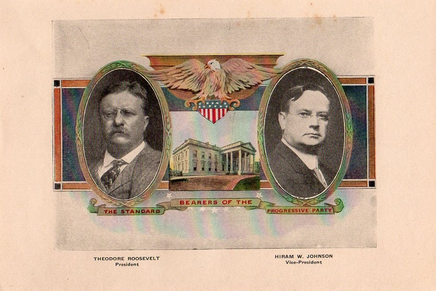Tuesday, June 18, 2019
Hiram Warren Johnson
Hiram Warren Johnson, September 2, 1866 (Sacramento, Calif.) – August 6, 1945 (Bethesda, Md.)
VP candidate for Progressive Party (aka Bull Moose Party) (1912)
Running mate with nominee: Theodore Roosevelt (1858-1919)
Popular vote: 4,122,721 (27.40%)
Electoral vote: 88/531
The campaign:
This is The Big One in the history of third parties in America.
Theodore Roosevelt failed in his bid to reclaim the presidency as a Republican at their convention. The conservative Taft forces outmaneuvered the liberal wing of the party. So Theodore Roosevelt being Theodore Roosevelt decided to perform an end run and make a bid as a third party candidate in the newly formed Progressive Party. His running mate was the reformist Governor of California Hiram Johnson.
It was a remarkable election, with three presidents-- past (Roosevelt), present (Taft), and future (Wilson)-- plus the Socialists at the height of their national electability. The nastiness of the name-calling and and personal nature of the insults between the Republicans and the Progressives seemed beyond the usual campaign mud-slinging.
The Progressive platform was filled with planks that had been well worn by the Populists and Socialists in the 1890s, but by 1912 many of those ideas were now socially acceptable.
Roosevelt was shot on Oct. 14, 1912 in Milwaukee, wounded in the chest but the bullet was slowed by TR's thick folded typewritten speech and his spectacles case. Not one to let good theater slip away, he gave his speech anyway. John Schrank, the would-be assassin, was found legally insane. All three of the major parties took a brief break from electioneering until Roosevelt recovered.
The Roosevelt/Johnson ticket placed second with 27.40% of the popular vote and 88 electoral votes. The Republican incumbent landed in third place.
On the ballot in 47 states the Progressives won the electoral votes of South Dakota, California, Michigan, Minnesota, Pennsylvania, and Washington. In California Roosevelt defeated Wilson by just under 200 votes, demonstrating the wisdom of placing Johnson on the ticket.
Impressive as this third party showing was, it could be argued that the Progressive Party was personality-driven and not policy-driven. Case in point-- as soon as Roosevelt rejoined the Republican fold the Progressive Party evaporated. Johnson went on to become a gadfly Republican in the US Senate, holding the record for longevity in that office from California.
Election history:
1911-1917 - Governor of California (Republican/Progressive)
1917-1945 - US Senate (Calif.) (Republican)
1920 - Republican nomination for US President - defeated
1924 - Republican nomination for US President - defeated
Other occupations: stenographer, attorney, assistant district attorney of San Francisco
Buried: Cypress Lawn Memorial Park (Colma, Calif.)
Notes:
Buried in the same cemetery as Joseph Alioto, Hubert Howe Bancroft, Eddie Fisher, William
Randolph Hearst Jr. and Sr., Tom Mooney, and Lincoln Steffens.
Declined to be Warren Harding's running mate in 1920.
One of his opponents in the 1916 Senate race was George S. Patton Sr., father of the later general.
One of his opponents in the 1922 Senate race was Socialist Upton Sinclair.
One of his opponents in the 1928 Senate race Charles Hiram Randall, the only member of the
Prohibition Party ever elected to the US House.
One of his opponents in the 1934 Senate race was George Ross Kirkpatrick, Socialist Party of
America VP nominee 1916.
Son of Grove L. Johnson (1841-1926) a Republican Congressman from California (1895-1897)
Although he voted to declare war with Germany he opposed America's entry into WWI, supported
the prohibition of Japanese immigrants, opposed the League of Nations and the United Nations. He supported FDR in the 1932 and 1936 elections. He was instrumental in the creation of the Japanese-American internment camps during WWII.
The old isolationist died the same day the atomic bomb was dropped on Hiroshima.













